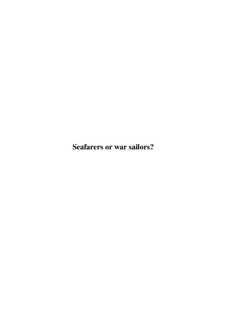Seafarers or war sailors? : The ambiguities of ensuring seafarers’ services in times of war in the case of the Norwegian merchant fleet during the Second World War
Doctoral thesis
Permanent lenke
http://hdl.handle.net/11250/2496983Utgivelsesdato
2017Metadata
Vis full innførselSamlinger
Originalversjon
10.1080/03468755.2015.1011686Sammendrag
This PhD thesis covers the following overall questions: With what means were the
services of the seafarers in the Norwegian merchant fleet ensured in the Second World
War, and what consequences did those efforts have for different groups of nationalities
onboard Norwegian ships? These questions are discussed through three separate
articles alongside an introductory section.
The three case studies show how strongly the changing historical circumstances
throughout the war influenced how the different groups of nationalities employed in
the Norwegian fleet were mobilised. The first article explores the mobilisation of
Norwegian seafarers and concludes that their service was ensured through a wide
range of means, including both push and pull measures. The second article concerns
the general use of foreign seafarers and finds that few war-related measures were
proactively taken to mobilise foreign seafarers. In the third article, the large and
atypical group of Chinese seamen on Norwegian ships is explored. They achieved
higher salaries and better conditions because of their protests during the war. As a
consequence, the Norwegian merchant fleet nearly stopped hiring Chinese seafarers,
despite the increasing need to recruit foreign crews.
This study concludes that the British influence on the mobilisation and management of
seafarers on Norwegian ships was more profound than previous research would
indicate. The United Kingdom was both setting the premises for and making a direct
impact on the Norwegian policy. British support was also crucial to be able to enforce
the increased control over seafarers. The increased state control in the Second World
War politicised the shipping economy and the use of seafarers, and their conditions
became diplomatic issues.
The seafarers’ civilian status came under pressure in various ways during the war and
this contributed to an ambiguous Norwegian policy towards them. They were
sometimes treated like “seafarers” and at other times like “war sailors”. This is a constructed dual terminology, used to explore the complex and shifting relationship
between normality and war in the case of the Norwegian merchant fleet.
